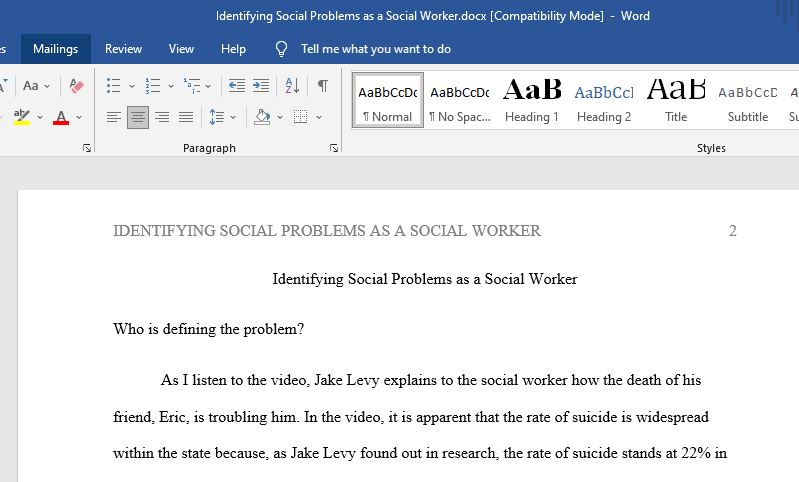Discussion: Analyses of Social Problems in Case Studies
As a social worker, often you need to use your policy advocacy skills to ensure that your clients are receiving the services that they need. Although you may tend to think of policy advocacy skills as separate from your clinical social work skills, they are very similar. Think of the skills that you would use in working with a client such as Jake Levy. How could you apply these skills to policy advocacy? How will you use these skills to identify the policy and social problems that are impacting these families? In this week’s Discussion, you will continue to follow the Levy, Bradley, Petrakis, and Cortez families to start the process of policy advocacy.
In this Discussion, select one of the four integrated videos and identify the problems experienced by the client(s).
https://drive.google.com/file/d/1_7iylA-Z3Mywj2XSI…
BY DAY 3
Post your responses to the following:
- Who is defining the problem?
- What values are reflected in this definition of the problem?
- What is being omitted in this definition?
- What other problems do you see that are not being acknowledged?
Be sure to support your post with specific references to this week’s resources. If you are using additional articles, be sure to provide full APA-formatted citations for your references.
BY DAY 5
Respond to a colleague who chose a case different from yours by addressing the following:
- Describe another way the identified problem can be defined.
- What policy advocacy skills do you think should be used to address the identified problem?
- What makes a social problem a social work problem?
Colleague: Andrea
Post your responses to the following:
- Who is defining the problem?
Tiffany’s social worker is explaining how the state has dropped the charges against her. The State passed a new law, “Safe Harbor” for exploited children, and recognizes Tiffany is a victim and not a criminal in her case (Laureate Education, 2013).
- What values are reflected in this definition of the problem?
“Safe” in Harbor is being recognized as a fundamental right to its young people. The State recognizes this social justice issue as a community issue which affects individuals, and families. The values being utilized are beneficence, empathy, self-determination, advocacy, nonmaleficence, and autonomy (NASW, 2018).
- What is being omitted in this definition?
The importance of human relationships is being omitted from the social worker’s conversation with Tiffany. “Social worker’s seek to strengthen relationships among people in a purposeful effort to restore, maintain, and enhance the wellbeing of individuals. Tiffany is conveying to the social worker her fear of her pimp. The social worker commits to Tiffany by offering to get her police protection without asking the client how she would feel about it.
- What other problems do you see that are not being acknowledged?
The social worker is assuming the client is going to be happy with the news of her charges being dropped and when she is not as excited about the news as the social worker is he starts to judge her by saying, “Before you were upset because you were being treated as a criminal, but not anymore”. The social worker’s lack of empathy, in that moment, is not accepting the client in the “Here and Now”.
References
Laureate Education. (Producer). (2013). Bradley (Episode 7 of 42) [Video file]. In Sessions. Retrieved from https://class.waldenu.edu
NASW (2018). Code of Ethics. Retrieved from https://socialwork.sdsu.edu/wp-content/uploads/201…
.doc file
Answer preview:

word limit:980
